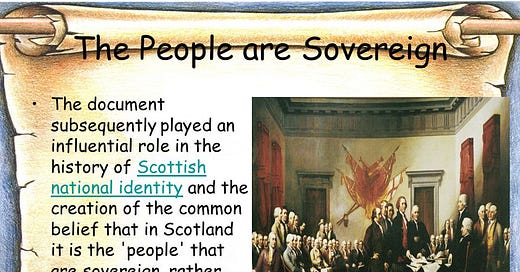Andy Anderson recently wrote to his MSP, as have many of us, to express his concerns about the Victims, Witnesses and Justice Reform (Scotland) Bill (VWJR), namely, that ScotGov is bypassing the Scottish People who, under a system of Popular Sovereignty, must consent to a bill that proposes constitutional change. He has shared this letter in which he elegantly argues that direct Political Rights such as a Referendum can not only give the Scottish People their voice back but also restore Scottish independence.
If you haven’t written to your MSP, you can still do so. Your MSPs e-mail addresses are at https://www.parliament.scot/msps
Dear MSP,
Re: Respect Scottish Sovereignty.
Thank you for responding so quickly, and for correcting my misunderstanding of the stage the bill had reached in the parliamentary process and explaining the full process to me.
However, I don’t think you have understood the point I am trying to make, so I will try again to explain it, because I believe it to be a very important one.
My interest is not on the content of the bill per se, it is in the procedure used in order to make the bill a legal document.
All of us in the Scottish independence movement are very well aware of the decision pronounced by the UK Supreme Court (UKSC) in September 2022. This judgement was not about Scottish Sovereignty, but about the powers of the Scottish Government, and as you know, it defined these powers as strictly limited to the powers specified in the Scotland Act (1998).
The UKSC is not unaware of the difference in Scottish Constitutional Law and English Constitutional Law in relation to the concept of “sovereignty.” Indeed, it set out its view on this in 2016, where it acknowledged the Scottish position that the People are sovereign under the Bill of Rights.
Now, if we were to accept this UKSC judgement of 2022 and ignore the UKSC judgement of 2016, we would be abandoning our long held constitutional position on sovereignty and adopting a feudal English law version which would ensure that the Scottish People could never have “legal” independence.
So, having been trapped in this legal “box canyon” without a way out, it is necessary for us to use our heads in order to out-fox the fox who put us into that trap. Fortunately, such a route is open to us if we are careful.
This VWJR Bill is currently in the formal process in the Scottish Parliament. It, like any other bill, will need to get sovereign approval before it becomes law.
Now, there are two ways that can be done. We can use the UK parliament system where bills approved by the UK Parliament are placed before the King who gives it Royal Assent - only then is it legitimate.
As we all know, the King’s role in this is merely as a puppet that does what the UK Parliament requires. As we have also seen recently, the UK Government can stop the King, its puppet, from giving Royal Assent to any bill from the Scottish Parliament that they don’t like.
So this system, if we are foolish enough to accept it, means that just over 300 MPs in the UK parliament have “sovereignty” over Scotland, even if not one of them lives in Scotland.
There is, however, another way open to our Scottish Parliament to get real sovereign authority. Since this bill touches on matters of long-standing constitutional law, the Scottish Government could reasonably decide that the bill, once passed through Parliament, should be put to the People in a referendum before it is presented to King Charles, the UK Government puppet.
If the Scottish Government did that, there could be little grounds for the UK Government, or the King to complain. So they would be unlikely to do so.
Now, think of the implications of the Scottish Government doing that. If the constitutional reforms were accepted in a Scottish referendum, which is the most likely outcome, then a new precedent will have been established.
(a) That the Scottish Government has authority to put constitutional issues to the Scottish People.
(b) That the Scottish People are re-affirmed as the sovereign in Scottish matters.
If the Scottish Government can set up that precedent then they will have changed the “legal” road to independence and opened the way for other legislation on our constitution, sanctioned by a referendum of the People. This is a way out of the legal box-canyon in which we have been trapped.
You are right, most people in Scotland are not currently interested in a referendum on the VWJR bill, because most people will not have looked at it in this way, and very likely that also applies to our unionist opponents. Leadership is about guiding people in the right direction, not waiting to see what way they are going before deciding on a policy.
Yes, you are right this policy will cost money, but it will pay for itself handsomely for the majority of people in Scotland who want a way forward towards independence but don’t know how to find it.
If the SNP could see the opportunity this bill gives them to get the traditional concept of Scottish sovereignty back into play and onto their side, then fears about the outcome of future elections in Scotland will vanish once the Yes movement sees the wisdom of this approach and recognises the importance of SNP leadership in the independence campaign.
Andy Anderson





Excellent proposal by Andy Anderson, giving Scots another wey oot o the colonial corset.
Unfortunately, we can expect the SNP colonial leadership to do nothing with it, much as they do not look for any innovation to liberate the people they are supposed to represent.
Excellent letter by Andy, and he explains so clearly why the Scottish Government should follow this route. I very much hope they do, thanks Andy.